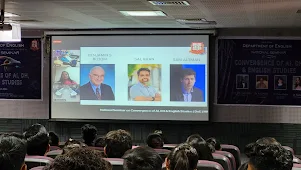Nirja's Journey
Neerja: “So much has changed. A new temple has been built, and new idols of gods have been consecrated. When I first came here, there was only the idol of Ramdevpir.”
Varinda: “Yes, now the idol of Rameshwar Mahadev has also been consecrated. A small temple for Kalbhairav Dada has been built. Every year, the celebration of Krishna Janmashtami takes place. Small trees have been planted next to the temple, adding to its beauty.”
Neerja: “And there’s been so much development at the Bapa Sitaram shrine nearby too.”
Varinda: “Yes, there’s the Bapa Sitaram shrine, Hanumanji temple, Mahadev temple, and Bahuchar Mata temple. In the evenings, children come to play there. A new platform has been built for birds to feed and drink water. At night, aarti is performed at both places, creating a joyful and devotional atmosphere. People celebrate all festivals together in harmony, without any discrimination. Everyone works together as well.”
As Nirja and Vrinda walked towards the temple, they were met with a lively scene. The temple grounds were decorated with beautiful colors, and there was a lot of activity around. The air was filled with the pleasant scent of incense and prayers.
They spotted their old friends waiting for them, and they greeted each other warmly. They caught up on each other's lives, sharing stories and laughter. The atmosphere was joyful and filled with friendship as they enjoyed being together in the peaceful setting of the temple.
Nirja asked her friends, "How's everyone?"
Raaghav noticed her mood and said, "Nirja, it's your birthday. Why do you seem down?"
"Just remembering some things from the past," Nirja replied sadly.
Varaa, concerned, asked, "What happened in the past that's bothering you now?"
Nirja hesitated before saying, "It's a long story."
Her friends assured her, "We're here to listen."
Taking a deep breath, Nirja began her tale.
"Once, we were a big family, living happily together," she started. "But then, everything changed. My grandfather decided we should live separately, so we moved. My father worked hard for us, but my mother, who was disabled, struggled."
"Then," Nirja continued, her voice quivering, "my mother died when I was just seven. Before I could understand what happened, my father remarried. My stepmother cared for me like her own, but then one day, both she and my father were gone."
"I became an orphan," Nirja concluded, her heart heavy with the weight of her past. “I went to live with my uncle. When I was twelve, I was sexually abused by a distant uncle, but I couldn’t tell anyone. I left home and went to live in a hostel.
After completing grade 12, I decided to go to college. In college, I befriended a boy named Shrikant. Over time, our friendship turned into love.”
She continued with a sob, “I loved Shrikant with all my heart. But he took advantage of my love. He started a business selling alcohol, creating nude photos, and blackmailing girls, which I didn’t know about. When I found out, I left him and filed a police complaint. But the police didn’t pay attention to the case because of greed for money. Since then, I’ve been living alone and working as a social worker. When I turned 20, I found out that my mother had committed suicide because of my father’s affair. My father had a love marriage, but my stepmother’s family didn’t like it, so they killed them both.”
Vrinda, touched by Nirja's story, spoke up, her voice filled with empathy. "Nirja, your journey has been filled with pain and challenges. It's truly heart-wrenching to hear. But despite everything, you've chosen to dedicate your life to helping others as a social worker. That's incredibly commendable."
She continued, her words a testament to Nirja's resilience, "Your story is an inspiration to us all. It shows that even in the darkest of times, there's hope and courage to move forward. I'm truly sorry for all you've been through, but I salute your bravery and perseverance."
Vrinda's words shifted to a message of support and celebration, "Even though today is your birthday and you're feeling sad about your past, remember that your friends are here with you. We want to celebrate with you and help you start a new chapter in your life. Knowing that you have us by your side should bring you joy."
She concluded with warm wishes for Nirja's future, "Your story and your courage inspire everyone around you. Happy birthday, Nirja. May your future be filled with brightness and happiness."
Click here to navigate to the Index/Main Page Kavisha Alagiya Ma'am





















.jpeg)


